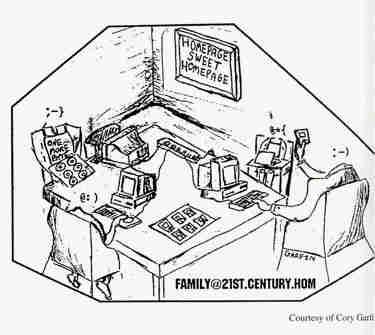Tok: Language: Articles from Cyberspace
Discussion group on Composing Cyberspace
Composing
Cyberspace
by Rich Holeton
The following is a synopsis of several articles in Holeton's
book. My own class comments and exercises have been inserted where
appropriate.
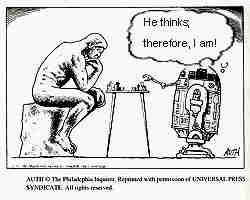
Forward Thinking: Can computer technology improve the quality of education and social justice?
Computer vs. Human:
Deep Blue first competed against Garry Kasparov in 1997 and won in a six game match.
What does this imply? How do we define intelligence? Is machine and human intelligence the same?
Humans and computers may slowly be exchanging roles. Already artificial aides and prosthesis implement human skills (contact lenses, hearing aides, artificial limbs, mechanical hands, heart sensors, etc.) Stephen Hawkings can use his eyes to "type" language, which the computer turns into audible text. Distinctions between uman and machine are becoming blurred.
Was Descartes wrong
?His belief that "cogito ergo sum" (I think; therefore, I am) implies the mindís superiority over the body and its senses, which he saw as deceptive. Can intelligence exist as a disembodied mind, or is there a duality necessary for true intelligence? Consider the movie The Matrix. After a nuclear destruction, humans are provided a world constructed by artificial intelligence. They could have chosen a utopia but preferred a more challenging and hostile environment. Those who realized they were chained in the matrix and were given the opportunity to escape, later desired to return. The movie loosely parallels Platoís "Allegory of the Cave?"
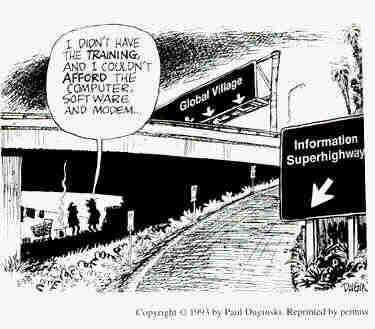
Information Highway:
Is information assessable to all? . . or does it increase distance between the haves and have-nots? By Y2K, Ĺ of all American will own home computers.
In developing world countries:
50% suffer from malnutrition
70% canít read
80% live in substandard housing
New technologies will primarily benefit affluent people and large corporations and will tend to centralize power and information, which is one and the same. As in 1984 and Brave New World, much of the control of history, money, and the future itself will rest with those who have access to information.
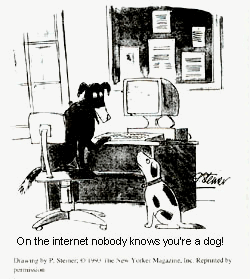
" Put Your Pants On Demonboy"
Barbara Ehrenreich
Ehrenereich writes, "We have no more use for our super-sophisticated communication technology than a chimpanzee has for a volume of Milton." What does she mean by this? Are we closer to escaping from the body with its non-stop announcements of age, race, and sex, or farther away? When was the last time you had a thrillingly deep conversation?
Consider the media: Sitcom put downs, braying politicians full of slogans and pundits, action shows full of clichťs and grunts, punctuated with gun shots, "talk shows" that contain very little communication but a great deal of posture and threatened violence.
[My notes]
There was a time when we thought TV was going to be a great
educational and humanitarian tool. What is
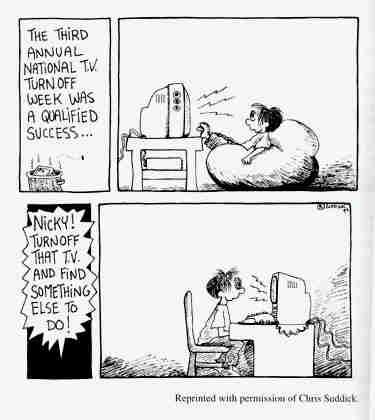 contained on those 500 cable channels? Dumped
upon
contained on those 500 cable channels? Dumped
upon
Last week I received e-mail from Cyber Investigator, where for a fee I could spy on my neighbors, friends, or boss. For example, I can find out how much alimony the lady next door is pulling in or check to see if my boss has ever been arrested for drunk driving. There is a lot of information out there, but it could hardly be called valuable in any positive sense.
"Body, Brain, and Communication"
Boal in interview with George Lakoff, professor of linguistics at BerkleyFor original, full article click here. Lakoff gave permissions to print this article found nowhere else on the web.
Lakoff establishes that he is not anti-computer, only that he has questions about whether artificial intelligence as it is envisioned can accomplish what everyone predicts. Memory is Storage: we retrieve and recall ideas that are objects put into words. In this sense language is a container, conduit, or channel for information, but intelligence is far more than retrieval of information.
This same information has to be interpreted and analyzed. Sometimes we donít even have the proper tools to access it or understand its language.
[class activity] Give class problem of statistic on marriage/divorce rate. Is it true that 1 out of every 2 American marriages end in divorce? Have the students brainstorm the possibilities and problems and then research the truth (if they can find it). Ask them to provide motives for why so many people have distorted this very false statistic.
Language communications on the computer fails when
- Speakers donít understand the same language or code (Chinese, HTML)
- Speakers come from a different subculture (Blacks, Hispanics, etc)
- We donít have the capability to retrieve the information (software not user friendly or we
are not aware of its existence. ) (Access to sold homes in past years)
Interpretation is always a problem. For example what would you infer by looking at my credit history and noting that every August I am late with my bills? Does this mean I am a poor credit risk? What does it mean?
t could mean I received my last paycheck in early August and had to wait one month for a paycheck.
Many believe that human rationality has its basis in mathematical logic (which was a precursor to computer programs). There is a first order logic, proofs, and a theory of formal systems, but research shows that many of us think in image schemas and spatial relationships.
Also we think a good deal in metaphors, not logic. Write down five words that explain you. Then draw five symbols that explain you. Which is the most direct method, the labeling with words or the pictures? Which was more effective or holistic in communicating who you truly are?
Metaphors also allow us to think in emotional ways. This weekend at the Miami Art Institute, workshops members were given a picture of a holocaust survivor and an abstract of their circumstance. When I wrote as if (metaphorically) I were a survivor, I felt deep empathy and sadness. Perhaps our understanding of history is influenced by how well we can empathize with the culture or peoples undergoing a war or dilemma.
Descartes would not wish to recognize that sensory perceptions or emotions are a part of who we are. Our rational powers are superior to our corporal selves. But Emmanuel Kant understands the opposite: that the visual and sensual enjoyment of art and nature give rise to higher reasoning. We think in fuzzier terms than sharp mathematical logic, for instance:
- Prototype structures typical and ideal cases
- Stereotypes of a social nature
Antonio Damasio, a neuroscientist, discusses a man who has all his rational faculties but has lost his capacity of feel. He can feel nothing about poetry, music, or sex. Additionally he is very bad in reasoning about his own personal life. Damasio claims that if we turn over our important policy decisions to computer programs, then our lives will be a mess because the emotional component is absent.
Lakoff contends that computers donít feel or understand anything because they donít have bodies and cannot experience anything. Most of our abstract concepts are extensions of bodily based concepts that have to do with motion and space. Then they get projected by metaphor onto abstract concepts.
Humans understand through the body. Computers can only follow algorithms.
(A step-by-step problem-solving procedure, especially an established, recursive computational procedure for solving a problem in a finite number of steps.)
Do computers at least liberate man from repetitive, computational work?
"Machine to machine"
Sadly, Lakoff, says no. It can turn you into even more of a machine performing repetitive tasks. Long hours in front of the computer does not get you out into the world, into nature, into the community, singing and dancing. You miss the human interaction.
"Fragmentation"
Also more work is being written now because of machines and it is more than people can take in. So there is fragmentation in academic fields. No one can grasp it all. There is more information but only a limited amount you can take in.
"Promises of Interaction and Virtual Reality?"
The interactive experiences available in software and on the web are really pretty un-interactive. There have to be canned answers and canned
possibilities. Example: Kingís Quest Five, a video game, was highly creative and imaginative, challenging logical abilities. Later the same
video game producer, Roberta William, creates Phantasmagoria, a rather limited video game with gore and violence.
Virtual Reality and artificial life are just that. Only virtual and artificial, poor substitutes for the real thing. You do not mistake the plans for the house. The
computer is not alive because it has organization modeled into it.
"Economics and Social Systems"
The Internet will not be free for long. The Internet is too big now to be a source of information for everyone; it will be a site for corporations,
entertainment, and advertisements, much like TV. Even Ross Perotís attempt at a town hall was an impossible event. During his one-hour only 20 people had access to him, not 50 million. You cannot have pure inquiry if someone controls the format.
"Come in, CQ" Ellen Ullmann
What Lakoff was talking about, the loneliness of the person sitting at the computer, is mirrored by Ellen Ullmann. Talk is controlled, my turn one at a time and there is this snow of reaching across space for someone to connect. She wakes her babies up that are sleeping and signs on. Somehow wasting hours
on a computer doesnít seem as bad as watching television all night. Even with e-mail no one answers in real time (if they answer at all). Her disembodied persona on the internet does not carry over or belong in the daytime world. Even the face of the computer is deceptive, underneath it is still that "same old fusty place created by the Department of Defense." You must keep track of your aliases.
Ullmann believe that there are fewer women talking on the Internet than men. It is only one way of communicating for them. But for men and women both the Internet can be an escape from the human community. She is an engineer who doesnít really build anything. We think. We type, Itís all grammar.
"Gender Bending "Dale Spender
There are clues to male/female behavior on the Internet communications:
Gives history of interactions: loud/soft language /holding babies/ eye contact and body positioning/ words for nag, whine, gossip/ bossy, aggressive, castrating as opposed to masterful. On Internet: alias must be neutral or male to avoid gender identification. She states that men take on alias and can act aggressive. I wonder if women donít sport bad behavior also.
